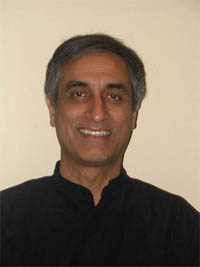Dr. Subhash Kak
Dr. Subhash Kak recently authored Artificial and Biological Intelligence in Ubiquity: An ACM IT Magazine and Forum and Machines and Consciousness in the book Philosophy of Science and History of Science which will be published in 2006.
Subhash is Delaune Distinguished Professor of Electrical and Computer Engineering at Louisiana State University. A pioneering cryptographer and neural network theorist, he has made fundamental contributions to speech scrambling, theory of random sequences, and quantum cryptographic codes; he has also researched the history of mathematics and astronomy.
Subhash joined the LSU faculty in 1979. He has worked in the areas of wireless, data security, neural networks, information technology, and quantum information processing. His research on neural networks has focused on instantaneously trained neural networks (INNs) and their applications to prediction, data compression, and communications.
His announcement of an astronomy of the Vedic period in his book The Astronomical Code of the Rgveda (1994) challenged academic views related to the Aryan invasion and the nature of early Indian science. The coauthored In Search of the Cradle of Civilization (1995) participates in the debate and polemics on the origins of Indian culture.
As a philosopher, Subhash maintains that a fundamental subject-object dichotomy makes it possible for science only to deal with objects and not with the perceiving subject and, therefore, it is impossible to create a formal science of consciousness. Since the mind can make models of the outer reality, which, at its deepest level, is quantum mechanical, he argues that the mind must have a quantum mechanical basis. But his view of how the brain works is different from other quantum approaches to it. He sees the brain as a machine that reduces the infinite possibilities of a quantum-like universal consciousness, which is a consequence of the recursive nature of reality. The mind can only operate sequentially while reality is simultaneous across countless dimensions, suggesting that such a reduction from a universal consciousness may explain the amazing feats of savants and creative people.
His ideas on mind and consciousness are scattered in a variety of writings. The most accessible sources for his philosophy of recursionism are his books Gods Within: Mind, Consciousness and the Vedic Tradition, Architecture of Knowledge: Quantum Mechanics, Neuroscience, Computers and Consciousness, The Nature of Physical Reality (American Univ. Studies V : Philosophy, Vol 17), and his numerous journal and encyclopedia articles.
Subhash received his Ph.D. in electrical engineering in 1970 from the Indian Institute of Technology, Delhi, India.
